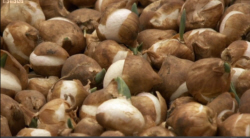Tulip Bubble - Market Volatility

In Holland, new wealth from the spice trade produced a new class of people - the middle class. And with the money came the search for status symbols… Fashion… Paintings… Porcelain.
On February 1, 1637, a Dutch textile merchant called Pieter Wynants had invited his extended family to Sunday lunch at his Haarlem home. The subject of conversation that day was the latest craze, tulips.
This had started with a few super-rich connoisseurs, who delighted in the splodges and dribbles of colour on the petals of a flower which had been admired for centuries. The rarest and most expensive were wildly coloured and striped, the result of a virus in the bulbs.
You never knew when you’d get a beautiful aberration, worth a great deal of money. The Dutch started buying tulip bulbs like lottery tickets. They knew all about speculation. Dutch merchants had created the world’s first stock exchange in Amsterdam in 1607. But the booming market in tulip bulbs meant anyone could make a fortune.

During the meal, Hendrik Jan Wynants suggested to Geertruyt Schoudt that she should buy a pound of tulip bulbs from him for 1,400 florins about the price of a house. Geertruyt was reluctant, but she was tempted.
All round Europe, the Dutch were famous for their love of gambling, and tulips seemed a sure bet. Prices were rising every day. Tulip sales usually happened in the back rooms of taverns, like the golden grape in Haarlem. Each round of selling began with a round of wine, paid for by the seller. Many buyers didn’t have the money to pay for the bulbs. They just gave one another IOUs. And the more they drank, the faster the prices rose.
This was the world’s first great speculative bubble. A pound of tulips were now changing hands for the price of a house, a farm, a pair of ships. These people might look sane, but they were in the grip of a disorder of the brain. They had caught “tulip mania”.

Geertruyt was still hesitating until another guest, Jacob de Block, offered to be the guarantor for eight days while she got the money together.
Finally, with this no-risk arrangement in place… Then another guest offered Geertruyt 100 florins profit on the spot if she’d sell the bulbs straight to him. But her backer, Jacob de Block, and his wife, convinced to hold onto the bulbs. They knew that if she didn’t pay them back in time, the tulips would be, theirs for an eight-day-old price. And with the price of tulips now rising by the hour… the de Blocks could make quite a profit.
Two days later, bulb prices were still rocketing. The money and wine were flowing as ever… Until the auctioneer try to sell a pound of Witte Croonen, white crown bulbs, for the going rate of 1,250 florins.

Then something mysterious happened - there were no buyers. He tried 1,200 florins. 1,150? 1,100. 1,000 florins? The fever had broken. The patient had woken up. Few people ever wanted all of those bulbs - they were only buying them to sell them on again. And so, the minute that confidence slipped, that that great drunkenness of optimism was over, everybody was desperately trying to get rid of them. Sell! Sell! Sell! That’s what happens in all of the speculative bubbles, whether it’s the Wall Street crash or the dot.com bubble - they all end the same way… pop!
The tulip market had collapsed in just four days. The Wynants family soon called in a lawyer. They are all giving their versions of who’d promised what during that Sunday lunch. Jacob de Block and his wife reneged on their offer to help Geertruyt. She was left holding the bulbs. It’s not known if she ever saw them bloom.
But tulip mania didn’t destroy the Dutch system - the stock exchange and the companies and the trading and a willingness to speculate. We call it capitalism.
And it’s lasted for longer than the European empires and it’s been worth infinitely more than all the gold and silver that Europe plundered.
It started here. And the tulips? Well, the Dutch turned them into an export trade, which they dominate to this day.
In less than a century and a half Europeans had gone from piracy to private enterprise. They’d rebelled against a church… Dominated world trade… And some had grown rich.
